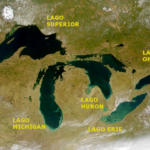Do sharks have tongues? Some people think they do and others think they don’t, but the truth lies somewhere in between. Read on to find out more about shark tongues and how they function in these amazing animals’ bodies!
Among their many other amazing adaptations, sharks are best known for unique tongues. The mouths of sharks contain structures resembling tongues. Unfortunately, they are not true tongues. These are bony projections in sharks’ mouths, also known as basihyals. They look like tongues while being not tongues at all. This is probably because a shark’s taste buds aren’t located on its tongue.
Sharks do indeed have tongues, but this sensory organ in them works quite differently than it does in humans. On our tongues, we have taste buds, while sharks do not have taste buds on their basihyals.
Taste buds are found throughout the shark’s mouth and skin. Within the mouth and throat of sharks, there is a special coating called papillae that houses their taste buds. Therefore, basihyal does not taste like food in any way.
Image Credits: pascallelay by pixabay free Images
How Big Are Shark Tongues
When you think of sharks, you probably think of sharp teeth and their menacing snouts. This leads to diversifying views on the size of their teeth, while some say they have big, large tongues, others say they have the smallest tongues in the animal kingdom. Read below to know how big shark tongues are and how they can affect the shark’s feeding habits.
According to most researchers, a shark’s tongue serves no purpose for the shark – not even taste buds. It’s a short, chubby, and immovable organ that’s not necessary for the shark to survive. Thus, shark tongues are merely small pieces of cartilage that are rarely used
Sharks have some of the most fascinating mouths in the animal kingdom, with unique teeth, jaws, and sometimes even multiple heads. But there’s one thing about these predatory fish that makes them even more unique is: their tiny, seemingly useless tongues. It’s like a mystery!
Sharks Tongue Function
Image Credits: weareaway by pixabay free Images
Have you ever taken a close look at the inside of the mouth of a shark? If not, then you will be delighted to know their incredible tongues. A shark’s tongue is far more than just an appendage that sits on the bottom of its mouth, it’s actually part of one of the most unique and fascinating systems on the planet. Let’s find out the major functions of their tongues.
Almost all shark species seem to use the basihyal for nothing, except for cookiecutter sharks, which use it to pull out flesh-cookies from their prey. They also help detect prey in murky water, navigate obstacles while swimming, and find hidden prey when there isn’t much light in the water.
Sharks’ tongues aren’t just used to push food down their throats like human tongues. In fact, sharks are able to smell with their tongues thanks to an organ called the ampullae of Lorenzini located on them.
So, Just like the rest of their body, the shark’s tongue has evolved to help them survive in their ocean habitat. It aids in feeding, removing unwanted particles from their mouth, and provides sensory input to the shark.
Can a Shark Stick Out its Tongue
Sharks are well known predators in the ocean, thanks to their sharp teeth, fascinating tongues and muscular jaws. But whether they can stick out their tongue or not is still a matter of debate. Find out whether they stick out their tongues and get to know about some of the other amazing shark facts below!
Sharks have a fixed tongue that sticks out from the bottom of their mouths. Since cartilage is a primary component, it is not very flexible; this means that they can’t stick their tongues out. Consequently, sharks cannot stick their tongues out of their mouths because their tongues are short and stout without taste buds.
Sharks, unlike other animals, usually do not have to use their tongue to catch prey. Consequently, they cannot use their tongues to get creative when hunting due to their length or placement. Their only need is to create a vacuum so that they can draw in their food.
Do Baby Shark Have Tongues
Image Credits: Goldbaker by pixabay free Images
Do baby sharks have tongues? Chances are you’ve never pondered this question, but your first reaction might be no, of course not! But then, after all, how can they eat if they don’t have tongues? Let’s find out!
Baby sharks do have tongues, however, these are not developed like full grown sharks. Research has shown that embryonic sharks possess a ‘tongue’ which is actually a highly modified piece of the cartilage called the basihyal. The basihyal has cartilaginous (like the teeth and gill arches) components, and is homologous to the tongue found in many other species.
Do Sharks Have Tongues in their Mouths
When we think of sharks, we think of those terrifying creatures that come with rows and rows of pointy teeth. We all fear the sharpness and the image of them sinking their teeth into our arms as we swim in the ocean but did you know that they actually have tongues in their mouths? Let’s find out
Sharks have a tongue which is called the basihyal. Located in the lower part of the mouth, the basihyal is composed of a thick piece of cartilage. It does not work on the majority of shark species, with the exception of the Carpet shark, Cookiecutter shark, and Bullhead shark.
The tongue of a shark is just like ours and those of many other animals. Yet sharks’ tongues do not serve the same purpose as human tongues do. Human tongues serve different purposes – they’re multifunctional. In contrast, shark’s tongues do not fulfill these functions. Hence, it is widely believed that shark tongues serve no position.
Do Great White Shark Have Tongues
Image Credits: MLbay by pixabay free Images
One of the most frequently asked questions about great white sharks is whether or not they have tongues – Let’s find out.
Great white sharks have tongues. But they don’t use them to eat their food. The tongue of a great white shark has two main purposes: grabbing prey and, once it’s eaten, sensing electricity for electroreception.
If a shark can sense electrical impulses around it (either from animals or other sources), it knows where to look for prey—and that information gives it an advantage when hunting in murky waters. Thus, tongues in great white sharks play a vital role.
Do Whale Shark Have Tongues
Whale sharks are called the giant of the sea, but how much do you really know about them? It is quite clear that whale sharks have an amazing set of teeth. But, do they have tongues? Let’s take a look at some fun facts that will answer all your questions and teach you more about this ocean giant.
The tongue of the whale shark seems like an odd, seemingly useless appendage, as it does not aid in feeding or swimming as one might expect from such a large animal.
However, in spite of their gargantuan proportions, their tongues are extremely small, measuring just 0.3–0.5 cm (0.12–0.20 in) in length, making them one of the smallest tongues among fish.
Do Hammerhead Sharks Have Tongues
Image Credits: goranmx by pixabay free Images
Hammerhead sharks have long fascinated due to their unusual appearance and nature, but no one knew exactly what their mouths and tongues looked like until now. Let’s find out.
Hammerhead Sharks are known as some of the most weird creatures on earth, and this includes their anatomy. One part of their anatomy that is completely useless, and has been like that since day one, are their tongues!
In sharks and other fishes, the tongue is found on the floor of the mouth which is also known as basihyal and they serve no purpose to hammerheads, as do other sharks.
Do Basking Sharks Have Tongues
One of the most iconic and recognizable sharks in the world, basking sharks are typically seen in shallow waters close to shore, which makes them relatively easy to spot (although still very difficult to catch). However, there’s one characteristic that many people don’t know about them: do basking sharks have tongues? The answer may surprise you!
Basking sharks are one of the largest species of sharks and are the second-largest living fish in the world, after the whale shark. Despite that they have short tongues that are useless in many terms as they lack taste buds and do not allow them to eat.
The basking shark has the smallest tongue in the world. The basking shark feeds almost entirely on plankton. Due to its small size it has a tiny mouth with a tiny tongue. The tongue is so small that it is almost useless. The basking shark uses suction to catch its food. However, there are many kinds of predators that hunt basking sharks. These include killer whales, other sharks and dolphins.
Conclusion
To conclude it can be said that sharks are amazing creatures with tongues. However the tongue of the shark is very small, immovable and not very useful, as it has no special features. The shark taste buds are located in the mouth, but also on the outside of the mouth and the tongue




